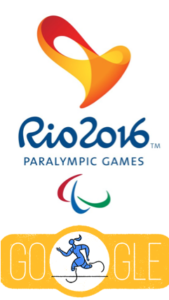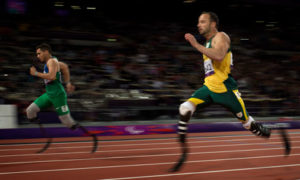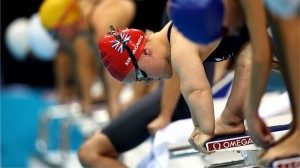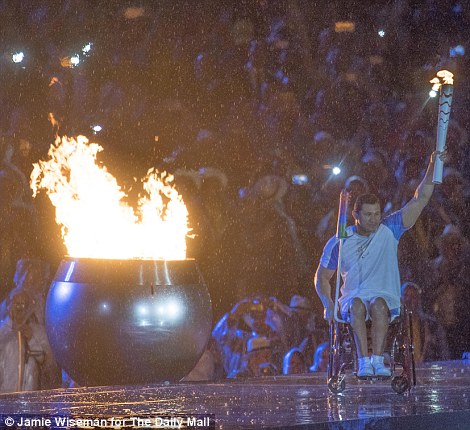 The Rio 2016 Paralympics got underway with the Opening Ceremony last night. If you live in the United States, however, you could be forgiven for having no clue (unless you happened to notice yesterday’s Google doodle heralding the start of these Games).
The Rio 2016 Paralympics got underway with the Opening Ceremony last night. If you live in the United States, however, you could be forgiven for having no clue (unless you happened to notice yesterday’s Google doodle heralding the start of these Games).
To be fair, this ceremony did have to compete for media coverage with the launch of Apple’s latest snake-oil product, the iPhone 7….
Of course, just as it was with the Olympics, NBC owns broadcasting rights to the Paralympics. But NBC gave the Paralympics only a fraction of the promotional hype it gave the Olympics. And this disparity will obtain to coverage of the events as well – with NBC planning to air only 66 hours of Paralympic competition; whereas it aired 6,755 hours of Olympic competition.
NBC will air almost all of this Paralympic coverage on its cable station, NBCSN. In fact, it has only scheduled a three-hour review on the final day of competition to air on its network station, which will only compound its discrimination against Paralympians with viewer frustration.
After all, many cable providers do not even carry NBCSN (e.g., Comcast does not in my area). This means that millions will have to “sign up” to watch live events online.
 But nothing personifies this media disinterest quite like NBC refusing even to send B-list anchors to cover the Paralympics. By glaring contrast, its coverage of the Olympics was such an all-hands-on-deck undertaking, NBC even dispatched Lester Holt, anchor of Nightly News, to report breaking news in America from Rio.
But nothing personifies this media disinterest quite like NBC refusing even to send B-list anchors to cover the Paralympics. By glaring contrast, its coverage of the Olympics was such an all-hands-on-deck undertaking, NBC even dispatched Lester Holt, anchor of Nightly News, to report breaking news in America from Rio.
Unsurprisingly, advocates for the disabled are accusing NBC of discrimination. Alas, such accusations are as much a quadrennial feature as complaints about host cities not being fully prepared.
Apropos of which, here is what I wrote four years ago in “In Defense of NBC’s Olympics vs. Paralympics Coverage,” September 14, 2012.
____________________
I have no idea how much NBC paid for the exclusive rights. But it’s an indication of the level of interest NBC banked on that it contracted to provide 3,500 hours of Olympic coverage, but only 6 hours of Paralympic coverage.
Unsurprisingly, people are criticizing the network for this limited Paralympics coverage, almost as much as they were criticizing it for broadcasting the Olympics on tape delay. What’s more, much of the criticism in this case is laced with accusations about discriminating against people with disabilities. Even I joined friends in venting reflexive, high-minded outrage.
Upon reflection, however, I believe criticisms in both cases are as unfair as they are uninformed. For I suspect exhaustive market research indicated that interest would be such that broadcasting any more than 6 hours would be a waste of capital resources.
I I can personally attest that NBC made the right decision in both cases. Because I was so eager to know the results of premier events at the Olympics that I went out of my way to find them online. Moreover, my interest was such that, just as NBC calculated, knowing the results did nothing to diminish my interest in seeing its tape-delay broadcasts.
 By instructive contrast, I’m ashamed to admit that the only time I became interested in anything related to the Paralympics was when the poster boy for these Games, Oscar Pistorius, suffered a surprising upset in the men’s 200m. And this was only because Pistorius received so much media attention during the Olympics for being the first double amputee to participate. Indeed, the greater is my shame that nothing but schadenfreude stoked my interest in actually seeing him humbled. …
By instructive contrast, I’m ashamed to admit that the only time I became interested in anything related to the Paralympics was when the poster boy for these Games, Oscar Pistorius, suffered a surprising upset in the men’s 200m. And this was only because Pistorius received so much media attention during the Olympics for being the first double amputee to participate. Indeed, the greater is my shame that nothing but schadenfreude stoked my interest in actually seeing him humbled. …
At any rate, I’m not sure what it says about me that I was so interested in watching 3,500 hours of the Olympics, but so uninterested in watching just 6 hours of the Paralympics, let alone searching the Internet for timely results.
 I have family members with disabilities. Therefore, I fully appreciate that the last thing Paralympians want is for their performances to evoke sympathy or, even worse, pity. Except that, as admirable and life affirming as their performances might be, a confluence of sympathy and pity is all I feel when I see people with disabilities competing in sporting events. …
I have family members with disabilities. Therefore, I fully appreciate that the last thing Paralympians want is for their performances to evoke sympathy or, even worse, pity. Except that, as admirable and life affirming as their performances might be, a confluence of sympathy and pity is all I feel when I see people with disabilities competing in sporting events. …
I would bet my life savings that 99 percent of you who tuned in to the Olympics did so to watch Michael Phelps and/or Usain Bolt compete. On the other hand, I challenge you to name a single Paralympian (who is not a relative or friend) who you wanted to watch compete.
Not to mention that people who rave about the performance of athletes with disabilities always come across like annoying parents raving about the first baby steps of their children. Which is why much of the celebration of the Paralympic Games strikes me as patronizing, disingenuous, and even a little guilt-ridden.
I don’t know if this constitutes discrimination on my part. What I do know, however, is that hundreds of millions of people feel as I do. Which is why nobody should criticize NBC for making the undeniably sound business decision to provide such limited coverage of the Paralympics.
____________________
Incidentally, notwithstanding the schadenfreude when I wrote this, I would not have wished the fate that befell Pistorius just months later, when he was arrested and charged for murdering his girlfriend. I shared my dismay in “Olympian Oscar Pistorius Now South Africa’s O.J. Simpson?” February 15, 2013, and “Oscar Pistorius Guilty of Murder. Duh,” December 7, 2015.
More importantly, notwithstanding my lack of interest, I wish all Paralympians well at these Games. And, for those of you who are truly interested in watching them compete, good luck finding coverage.
That said, I’d be remiss not to share two related points:
- Brazil’s dirty little secret.
Specifically, in the run up to the Olympics, the media were replete with reports about how the government gentrified and effectively quarantined its poor citizens to present the country in a more developed light.
 Whereas, in the run up to these Paralympics, the media were scarce with reports about how it treats its disabled citizens. It speaks volumes that the London Daily Mail waited until opening day to report on Brazil’s discrimination against, and lack of accommodation for, the disabled. But that report included the following:
Whereas, in the run up to these Paralympics, the media were scarce with reports about how it treats its disabled citizens. It speaks volumes that the London Daily Mail waited until opening day to report on Brazil’s discrimination against, and lack of accommodation for, the disabled. But that report included the following:
Paralympics host Rio de Janeiro is hiding a shameful record of discrimination against its own disabled people, with wheelchair users excluded from most public buildings and often denied their basic rights, campaigners say.
‘How can Rio be fit to host the Paralympic Games if it doesn’t even respect its own citizens living with disabilities? The city council will pretend to the world that they care about disabled people, but their actions prove the opposite,’ [said Disability campaigner Teresa Amaral].
- The International Paralympic Committee banning Team Russia.
The Paralympics will feature 4,300 athletes, although none from Russia. The International Paralympic Committee [IPC] has banned all Russian athletes because of alleged state-sponsored doping in the country.
The IOC permitted some Russian athletes to participate in the just-concluded Olympics, largely leaving the decision to international sports federations.
(NBC Sports, September 6, 2016)
I commented on the IOC and the spectre of Russia’s state-sponsored doping in “IOC failure to Ban Russia Proves It’s in Putin’s Pocket,” July 25, 2016, and “In Putin’s Russia Even Athletics Is a Criminal (Doping) Enterprise,” November 9, 2015. And I commented on the IPC’s decision to upstage the IOC by banning all Russian athletes in “Rio Olympics: Day 3,” August 8, 2016. I pointedly decried the moral injustice of Russia’s disabled athletes paying for the sins of its abled athletes.
Let the Games begin!
Related commentaries:
NBC Paralympics…
Clarion call to ban Russians…
Putin’s Russia…
Pistorius SA’s OJ…
Pistorius guilty…
